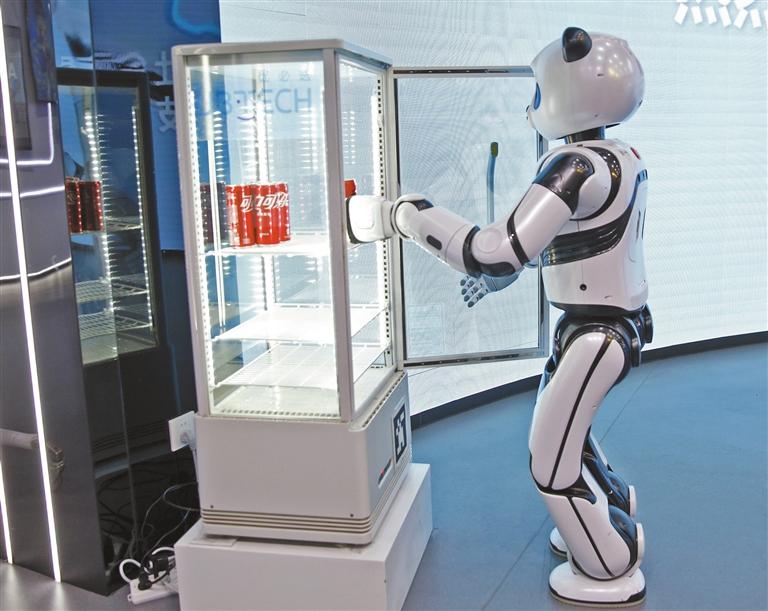
UBTech's Panda Robot retrieves a can of coke from the refrigerator in the company's office Feb. 29, 2024. Xinhua
Robots are considered "the crown jewel of the manufacturing industry," with humanoid robots being the ultimate goal for many in the industry. The research and development, manufacturing, and application of human-like robots are important indicators of a country's technological innovation and high-end manufacturing levels.
Shenzhen has proposed carrying out the development and application of universal embodied intelligent robots and will speed up the launch of a humanoid robot manufacturing innovation center.
Shenzhen-based UBTech Robotics has been listed by the province as an industrial pioneer in the commercialization of humanoid robots in the province.
Commercialization
UBTech, which was founded in 2012 and introduced its first humanoid robot a couple of years later, is China's biggest manufacturer of educational and humanoid robots.
The firm's Walker robot is the world's first commercialized biped (uses two legs for walking) robot for the consumer market. In the sector, Walker is considered one of the top five advanced humanoid robots in the world along with Boston Dynamics' Atlas, Agility Robotics' Cassie, Toyota's T-HR3, and Honda's E2-DR.
UBTech announced April 1 that it has partnered with Baidu Inc., China's largest internet search engine, to give Walker S, its new industrial humanoid robot, the power of natural speech and real-time reasoning.
Thanks to the integration of Baidu's ChatGPT-like conversational AI product Ernie Bot, the Walker S can respond to voice commands and fold clothes, sort objects, and answer questions about how to match clothes when prompted, as seen in a video distributed by UBTech.
UBTech launched the Walker S last year to serve industrial applications and quickly entered into partnerships with several automakers "to strategically plan the phased implementation of humanoid robots in manufacturing scenarios."
The Walker S was one of two humanoid robots onstage with Zhou Jian, founder and CEO of UBTech, in Hong Kong late last year to strike the gong to mark the listing of the company on the Hong Kong stock exchange. It is the first-ever listing ceremony where humanoid robots struck the gong, and it was hailed as a milestone event in accelerating global commercialization of humanoid robots.
Zhou has listed three major application scenarios for UBTech's humanoid robots including industrial manufacturing, commercial services, and household companionship, per the firm's website.
In particular, intelligent manufacturing will be the first area of large-scale application for humanoid robots. They will redefine what a worker is in the AI era and liberate humans from repetitive labor. The commercial services sector represents the fastest-growing market for humanoid robots, but the greatest potential for humanoid robot applications is within households, according to Zhou.
UBTech has made significant progress in the commercialization of its humanoid robots by having the Walker S "work" in industrial smart manufacturing.
Electric vehicle startup Nio Inc. said Feb. 22 that it tested the Walker S robot on the assembly line of one of its factories in Hefei, Anhui Province.
It was the first time Walker S had real-world training at a new energy vehicle factory, UBTech Robotics said.
During the training, the Walker S utilized its real-time image capture and transmission capabilities to participate in quality-control inspections of door locks, seat belts, and headlight covers and was able to affix vehicle logos, according to a video shared by UBTech.
Humanoid robots need to be adopted in the industrial smart manufacturing space, according to UBTech. In order to achieve that goal, it will be important to get robots into real factory environments to find solutions, it said.
Large number of patents
As a high-tech firm, UBTech, backed by internet giant Tencent Holdings, has concentrated on the research and development (R&D) of core technologies for humanoid robots since its establishment in 2012.
It has established a comprehensive portfolio of full-stack core technologies, including robotic motion planning and control, servo actuators, computer vision and voice interaction, autonomous technology, visual servo operation, and human-robot interaction, according to the firm's website.
The firm's R&D investment rose 14.5% year on year to 490 million yuan (US$67.7 million) in 2023, accounting for 46.4% of the firm's total operating income in 2023. Over the past four years, UBTech's R&D investment has averaged more than 50% of its operating income, the firm's annual financial report, issued March 28, showed.
In 2023, UBTech continued investing in the R&D of humanoid robots. As of the end of 2023, it had obtained more than 2,100 robot and AI-related patents, a significant increase of 31.25% compared with the previous year.
The company has averaged nearly 200 patent applications for humanoid robot technologies annually over the past five years, beating out industry leaders such as Honda, Toyota, and Boston Dynamics to rank first globally, the report said.
UBTech leads the world in the number of valid invention patents related to humanoid robots, according to a report issued by the research institute of People.cn, a domestic news portal.



